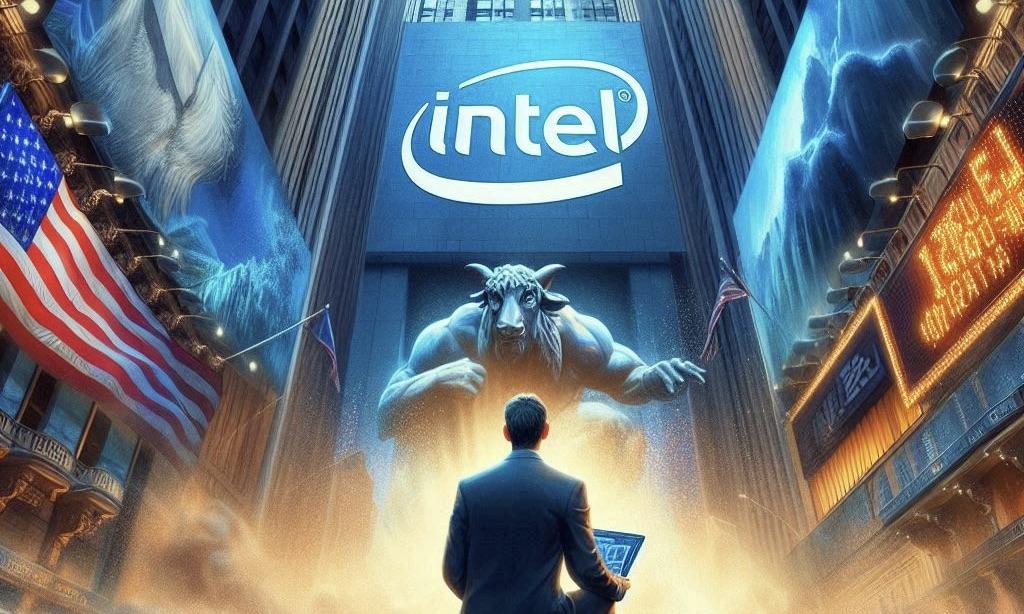Intel's stock has plummeted nearly 60% this year, putting the company at risk of being removed from the Dow Jones Industrial Average. As Intel prepares a revival plan, the potential loss of this blue-chip status could further impact its market position.
Intel’s Persistent Stock Decline Could Lead to Dow Jones Removal, Threatening Vital Passive Inflows
Intel's stock price trajectory has become increasingly predictable: the stock declines on up and down-market days. This consistent underperformance, leading to a nearly 60 percent drop in Intel's shares this year, puts the stock at risk of losing a key source of passive inflows—the Dow Jones Industrial Average (DJIA) index.
According to a recent report from Reuters, Intel is likely to be removed from the Dow Jones index. The DJIA rebalances quarterly, systematically adding or removing stocks based on a comprehensive set of criteria. If Intel is removed, it would be a significant blow for the company, as it has been one of only two tech stocks, alongside Microsoft, to join the Dow Jones during the dot-com bubble of the 1990s. Losing its place in this prestigious index would strip Intel of a vital source of passive funding that typically benefits blue-chip stocks, potentially exacerbating the stock's decline.
This development coincides with Intel's preparation for a broad-based revival plan, which it plans to present at its upcoming board meeting. Reports indicate that the company is considering unloading its majority stake in its FPGA arm, Altera, and freezing construction on its $30 billion facility in Germany. However, Intel is not expected to divest its chip manufacturing division, Intel Foundry.
Intel Engages Morgan Stanley for Strategic Guidance Amid Financial Cuts and Activist Investor Pressure
Intel is reportedly working closely with several financial advisers, including Morgan Stanley, to explore strategic options for its board meeting. These advisers, with their expertise and experience, are crucial in helping the company navigate a rumored high-profile challenge from activist investors.
Intel has taken several measures to ensure financial stability. The company has cut its dividends and reduced its workforce by 13.6 percent, laying off approximately 15,000 employees at the start of the year. It has also slashed its capital spending for 2025 by 17 percent, bringing it down to $21.5 billion.
As of the latest trading session, Intel shares have dropped by around 6 percent, leaving the company's market capitalization at $89.30 billion.



 Panama Investigates CK Hutchison’s Port Unit After Court Voids Canal Contracts
Panama Investigates CK Hutchison’s Port Unit After Court Voids Canal Contracts  Paramount Skydance to Acquire Warner Bros Discovery in $110 Billion Media Mega-Deal
Paramount Skydance to Acquire Warner Bros Discovery in $110 Billion Media Mega-Deal  Amazon’s $50B OpenAI Investment Tied to AGI Milestone and IPO Plans
Amazon’s $50B OpenAI Investment Tied to AGI Milestone and IPO Plans  Trump Media Weighs Truth Social Spin-Off Amid $6B Fusion Energy Pivot
Trump Media Weighs Truth Social Spin-Off Amid $6B Fusion Energy Pivot  Hyundai Motor Plans Multibillion-Dollar Investment in Robotics, AI and Hydrogen in South Korea
Hyundai Motor Plans Multibillion-Dollar Investment in Robotics, AI and Hydrogen in South Korea  Trump Warns Iran as Gulf Conflict Disrupts Oil Markets and Global Trade
Trump Warns Iran as Gulf Conflict Disrupts Oil Markets and Global Trade  APEX Tech Acquisition Inc. Raises $111.97 Million in NYSE IPO Under Ticker TRADU
APEX Tech Acquisition Inc. Raises $111.97 Million in NYSE IPO Under Ticker TRADU  FAA Plans Flight Reductions at Chicago O’Hare as Airlines Ramp Up Summer Schedules
FAA Plans Flight Reductions at Chicago O’Hare as Airlines Ramp Up Summer Schedules  Nvidia Earnings Preview: AI Growth Outlook Remains Strong Beyond 2026
Nvidia Earnings Preview: AI Growth Outlook Remains Strong Beyond 2026  OpenAI Targets $600B Compute Spend as IPO Valuation Could Reach $1 Trillion
OpenAI Targets $600B Compute Spend as IPO Valuation Could Reach $1 Trillion  OpenAI Pentagon AI Contract Adds Safeguards Amid Anthropic Dispute
OpenAI Pentagon AI Contract Adds Safeguards Amid Anthropic Dispute  Snowflake Forecasts Strong Fiscal 2027 Revenue Growth as Enterprise AI Demand Surges
Snowflake Forecasts Strong Fiscal 2027 Revenue Growth as Enterprise AI Demand Surges  Samsung Electronics Stock Poised for $1 Trillion Valuation Amid AI and Memory Boom
Samsung Electronics Stock Poised for $1 Trillion Valuation Amid AI and Memory Boom  Nintendo Share Sale: MUFG and Bank of Kyoto to Sell Stakes in Strategic Unwinding
Nintendo Share Sale: MUFG and Bank of Kyoto to Sell Stakes in Strategic Unwinding  Middle East Airspace Shutdown Disrupts Global Flights After U.S.-Israel Strikes on Iran
Middle East Airspace Shutdown Disrupts Global Flights After U.S.-Israel Strikes on Iran  Netflix Declines to Raise Bid for Warner Bros. Discovery Amid Competing Paramount Skydance Offer
Netflix Declines to Raise Bid for Warner Bros. Discovery Amid Competing Paramount Skydance Offer  Synopsys Q2 Revenue Forecast Misses Expectations Amid China Export Curbs and AI Shift
Synopsys Q2 Revenue Forecast Misses Expectations Amid China Export Curbs and AI Shift 































